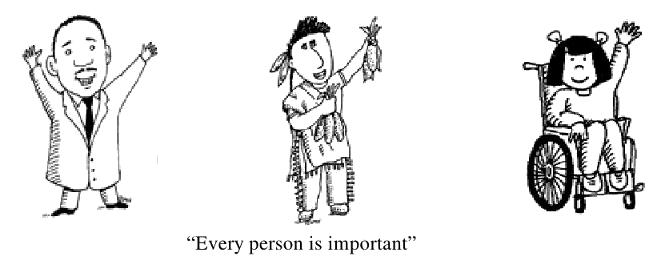Read the Previous Principle, Read the Next Principle, or Return to table of contents
Principle 3: Every person is important

You are important just because you were born here on earth. That, all by itself, makes you important. Why? Because we each have something to contribute to our group. If we don’t give our talents and our thoughts the group will not get them. That would be sad. No two people are alike. We are all different from each other. The Native American is different than the girl in the wheelchair. Being different from each other makes our group stronger. That is because each person has something to offer the group that no one else has. Remember, no two people are alike so each one has something different to offer. We don’t want to loose these precious differences. Our differences make us strong. Do you think the African American man might have different ideas than the Native American man? Of course. Their lives are different. They have had a different set of experiences. And, the girl in the wheelchair will have different experiences than people not in a wheelchair.
There is another reason that each person is important. That is because we each have something of great value—human feelings, hopes and dreams. Having feelings, hopes and dreams is part of being human. Do you think the African American man wants a good life? Does he have feelings, hopes, and dreams? What about the Native American man? Does he have feelings, hopes, and dreams? Should the girl in the wheelchair be less important because she is a female? She has feelings. Should she be less important because she has a disability? Do people in wheelchairs have hopes and dreams? She
has a disability but she is still important because she is a person. No one is more important than the other. Each one is different from the others and each one has feelings, hopes and dreams. Just being a person in a democracy makes you important. The sun shines on all people.
Story:
Finally lunchtime came. The lady was back from the village. Everyone helped make the sandwiches and stir the soup and make the drink. Lunch tasted almost as good as breakfast. Then the lady took them outside. They sat down under a tree in the front yard. The look on her face was sort of serious—like she was thinking of something important. After a pause she spoke.
“You two kids are important. Everyone here is important. Do you know why I say that?” She asked. They didn’t.
“Well,” she continued, “I was raised to think that everyone is important. Everyone is human, everyone has feelings, and everyone has something to offer to the group. That’s because everyone is different.
We have Mr. Wilson A. Bentley to thank for teaching us that no two snowflakes are alike. Mother Nature made each one a little different than the other. Well, it’s the same with people—no two are alike. It is the differences that make life interesting. So, everyone is important because he or she has something different to offer than what the next person has to offer.” She seemed to be done talking. So that was it! She brought them out here just to tell them that everyone is important! But then she started up again. To be continued....
Activity: Ask: Who is the most important person in the world? Write student suggestions on the board. They will likely name people that are seen as important because of some trait. After a few names are on the board, you can say, “Oh, does that mean a rich person should be more important than a scientist?” And, “Does that mean a professional person is more important than a nonprofessional?” “What is it that really makes a person important in a democracy?” Keep the discussion going until it becomes obvious that no trait makes a person more important than another. Not education, money, body shape, gender, color, etc. It is merely being a human being that makes one important in a democracy. You might close with, “Remember, the sun shines on us all!”
Additional activity: By now many students will understand the point: nothing other than being a person is needed to make one important in a democracy. To reinforce the concept, choose a few traits and quiz the students. “Miguel is taller than Juan. Is Miguel more important than Juan?” “Elaine has blue eyes and Sonia has brown eyes. Is Sonia more important than Elaine?” Do this with other traits such as hair color, location in the room, having a long or short name, etc. Students will understand that traits are not what makes one important in a democracy.